Directions (1-5): Radar graph given below shows the distance between Mumbai to five different cities (Lucknow, Delhi, Pune, Gorkhpur & Kanpur) in kilometer and Table given below shows the speed of five different Rajdhani express (A, B, C, D & E) trains in km/hr.

NOTE: – Some data is missing you have to calculate the missing data according to question.
Q1. Time taken by train ‘A’ to travel from Kanpur to Mumbai and then Mumbai to Delhi is equal to the time taken by train C to travel from Mumbai to Lucknow and then Lucknow to Delhi. Find the distance between city Lucknow and city Delhi.
(a) 5650 km
(b) 5750 km
(c) 5450 km
(d) 5550 km
(e) 5320 km
Q2. Find the approximate time train E takes to reach Kanpur from Lucknow, if Lucknow and city Kanpur is in north and in east direction of Mumbai respectively.
(a) 12 hours
(b) 16 hours
(c) 18 hours
(d) 10 hours
(e) 9 hours
Q3. Train B and train D start from Mumbai for Delhi and Pune respectively and they reached in equal time. If train B and train D starts from Delhi and Gorkhpur respectively at same time and move towards each other, then time taken by train B to cross train D is what percent of the time taken by train B to reach Delhi from Mumbai. [Distance between Delhi and Gorkhpur is 1500 km].
(a) 25%
(b) 20%
(c) 30%
(d) 40%
(e) 50%

Q5. Train A and train B start from Mumbai for Lucknow. Train B reaches first at Lucknow and meets train A in between the way, which is 200 km from Lucknow. Find after how much time they will meet second time after first time meeting if both trains continue, their to and fro motion.
(a) 14 hours
(b) 15 hours
(c) 16 hours
(d) 12 hours
(e) 10 hours
Q6. The difference of a three-digit number and the number formed by reversing its digits is more than 198. The sum of the units and tens digit is the same as the difference of the hundredth and the unit digits and also the hundredth digit is twice of the unit digit. Find the number.
I.613 II.603 III.623 IV. 804 V.834 VI.824
(a) Both II and IV
(b) II, IV and V together
(c) I, III and V together
(d) Both I and VI
(e) None of these
Q7. A boat takes 2 hours to travel from point A to B in still water. To find out the speed in upstream, which of the following information is/are required?
I. Distance between point A and B.
II. Time taken to travel downstream from B to A.
III. Speed of the stream of water.
(a) All are required
(b) Any two of the three
(c) Only I and II
(d) Only I and III
(e) Only II and III
Q8. Quantity I: In the town, shopkeeper’s union has decided to buy and sell goods in the range of Rs. 500 to Rs. 999 and a shopkeeper on a particular day decides not to buy or sell goods for amounts that contain the digit 9 or for amounts that are a multiple of 13. What is the maximum possible profit he can earn for an item?
Quantity II: difference between the largest and the smallest sum. A sum of Rs. 1440 is lent out in three parts at SI in such a way that the interests on first part at 2% for 3 years, second part at 3% for 4 years and third part at 4% for 5 years are equal.
(a) Quantity I > Quantity II
(b) Quantity I < Quantity II
(c) Quantity I ≥ Quantity II
(d) Quantity I ≤ Quantity II
(e) Quantity I = Quantity II or No relation
Q9. There are two bags A and B. Bag A contains 5 blue balls and _x_ red balls and bag B contains _x_ blue balls and 8 red balls. If one ball is chosen at random from any one bag, then the probability that it is a red ball is 5/9. Which of the following can be the value of x?
I. 10 II. 4 III. 3 IV. 5 V. 6
(a) Only I
(b) Only V
(c) Both I and IV
(d) Both II and III
(e) Both I and II
Q10. X, Y and Z secured 45%, 50% and 60% marks respectively in Biology. W’s marks in Biology is 12.5 more than X’s marks and 4 less than Z’s marks. To find the individual marks of four students which of the following statements are required.
I. For the student total marks obtained in Biology is 311.5.
II. Total of W’s and X’s marks in Biology is 147.5.
III. Z has obtained 84 marks.
(a) I and II together
(b) Only III
(c) A and either II or III
(d) All together
(e) None of the above
Solutions



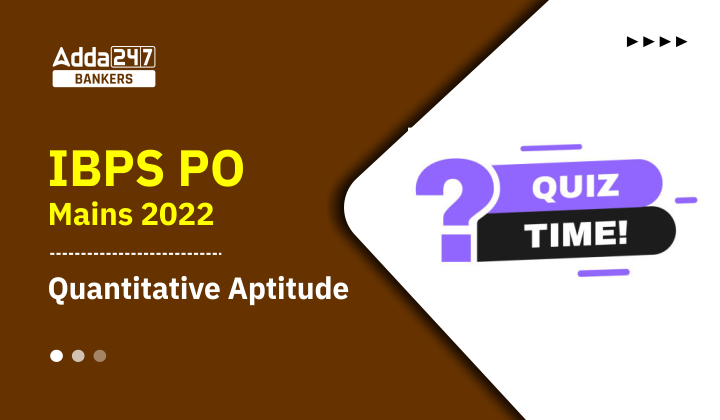
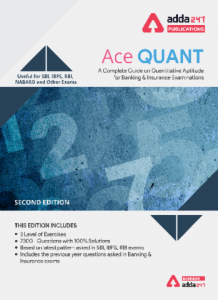

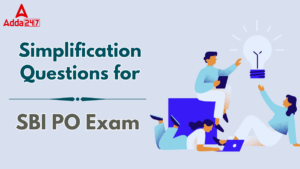 Simplification Questions for SBI PO Exam
Simplification Questions for SBI PO Exam
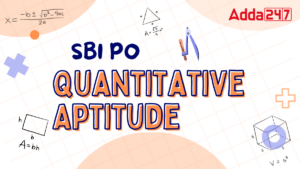 SBI PO Quantitative Aptitude 2025, Impor...
SBI PO Quantitative Aptitude 2025, Impor...
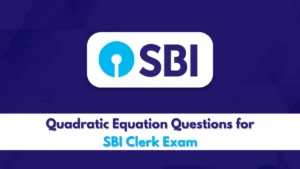 Quadratic Equation Questions for SBI Cle...
Quadratic Equation Questions for SBI Cle...







